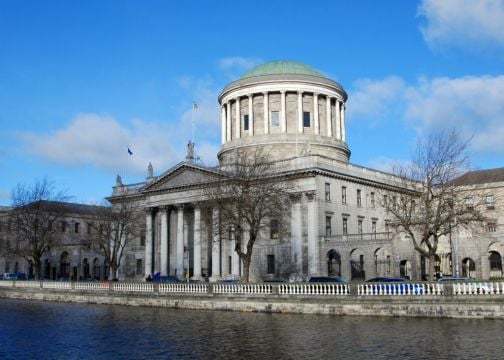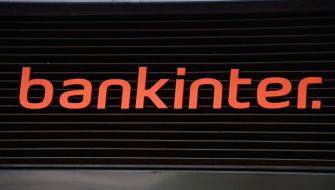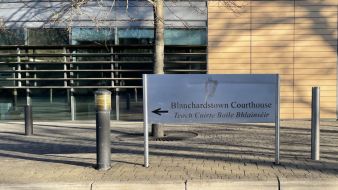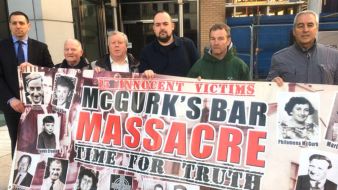The use of mobile phones records to convict a Kinahan hitman of the attempted murder of James 'Mago' Gately was a breach of his right to privacy under Irish and European law, the Court of Appeal was told on Thursday.
Gately, a member of the rival Hutch faction, was shot five times as he sat in his car at the Topaz filling station on the Clonshaugh Road in north Dublin at lunchtime on May 10th, 2017.
The victim, who was warned by gardaí of a threat to his life and wore a bullet-proof vest, survived the shooting after sustaining injuries to his upper chest and neck.
Caolan Smyth (30), formerly of Cuileann Court, Donore, Co Meath, but now a prisoner at Cork Prison, had pleaded not guilty to Mr Gately's attempted murder. He had also denied the possession of a firearm with intent to endanger on the same date and location.
His co-accused, Gary McAreavey (54) formerly of Gort Nua, Station Road, Castlebellingham, Co Louth, but now a prisoner at Portlaoise Prison, had pleaded not guilty to acting to “impede an apprehension or prosecution by purchasing petrol and assisting in the burning out of the vehicle, a black Lexus, used in the attempted murder” at Newrath, Dromiskin, Co Louth on the same day.
Both men were found guilty of the charges, however, following a trial at the Special Criminal Court in January 2021 and they were jailed for 20 years and three years respectively.
Appeals
They have since launched appeals against their convictions.
In a written submission, lawyers for Smyth argued that the trial court had erred by admitting into evidence mobile phone data that had been gathered pursuant to the Communications (Retention of Data) Act 2011.
It was further argued that a judgment by Mr Justice Tony O’Connor in Dwyer versus the Garda Commissioner case in 2018 had “granted declaratory relief to the effect that Section 6 of the 2011 Act was incompatible with European Union law”.
At the Court of Appeal on Thursday, John Fitzgerald SC, for Smyth, said the case against his client had been “complicated and dense” and had relied on mobile phone evidence.
Mr Fitzgerald said the prosecution contended that the combination of CCTV footage and mobile phone location data had proved that shortly after Gately had been gunned down, the ‘murder car’ used in the shooting – a black Lexus with diplomatic plates – had been driven from the crime scene to Dromiskin, Co Louth, by Smyth.
It was the State’s case, counsel continued, that it was at this location where Smyth was met by McAreavey and the two men set the Lexus on fire, destroying it completely.
Right to privacy
However, counsel continued, it was submitted that the gathering and retention of the mobile phone evidence used against his client had breached his client’s right to privacy under Irish and European Union (EU) law.
“We can safely say that Mr Smith would not be here were it not for the availability of call record data showing his location around the time of the shooting,” Mr Fitzgerald said.
“In summary, the material at the core of this case was retained in breach of Irish and EU rights law.”
In response, Anne-Marie Lawlor SC, for the Director of Public Prosecutions (DPP), said Mr Fitzgerald was entirely correct to state the prosecution case had relied on mobile phone data.
Ms Lawlor also advised the court that the DPP would be relying on their written submissions, which stated that the phone records used to convict Smyth had been recovered legally by gardaí.
Furthermore, the DPP argues that legislation used to access the data is “good law” in Ireland and will remain so until determined otherwise.
Appeal in tandem
In an appeal running in tandem, lawyers for McAreavey, who was convicted of assisting an offender contrary to Section 7 (2) of the Criminal Law Act 1997, claim the Special Criminal Court erred in finding that their client was aware that Smyth had committed a serious offence when the two men met to burn out the Lexus.
Hugh Hartnett SC, for McAreavey, told the court that “at no stage” during his client’s trial did the prosecution attempt to lead evidence which would have given an insight into his client’s state of mind at the time of the offence.
“Is that type of speculation appropriate in a criminal case?” he asked. “It could have been an insurance job. It could have been anything – and that is an intolerable vagueness within criminal law.”

Responding to Mr Hartnett, Dean Kelly SC, for the DPP, said there was “no ambiguity or even a hint of ambiguity in the plain words” of legislation used to convict McAreavey.
As an example, he said that if a man in a balaclava were to arrive at his doorstep one night to ask him to dispose of a briefcase in Dublin Bay and to not tell anyone about what he had done, then he would be considered innocent of any wrongdoing during any possible prosecution of the matter.
“That is a preposterous situation, and that is not what the act provides for,” Mr Kelly said.
Judgment in both appeals has been reserved.







